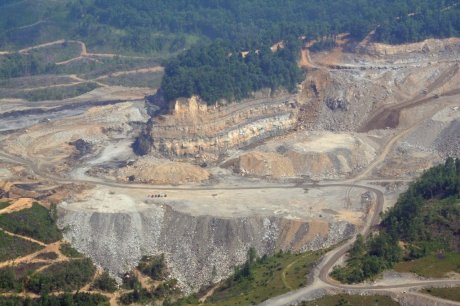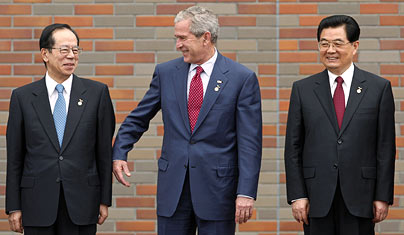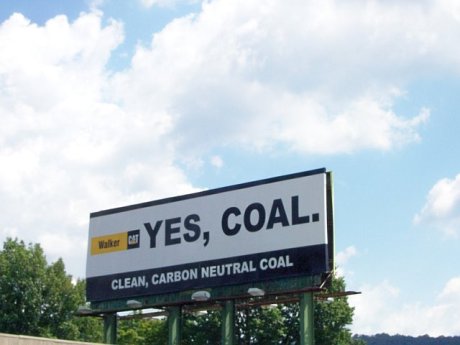Dethroning King Coal December 1, 2008
Posted by Jamie Friedland in Climate Change, Coal.Tags: CCS, Clean Coal, Clean Water Act, Coal, Coal Mining, Corruption, Don Blankenship, Environmental Protection Agency, EPA, George W Bush, Massey Energy, Mountaintop Removal, NRDC, Pollution, Walker Machinery, West Virginia
3 comments
Last month I was fortunate enough to drive through – and not stop in – the lovely state of West Virginia. It was dark, but between the mountain passes I did get to do some sightseeing. I was impressed by the neoclassical grandeur of the state capitol building, but I was also treated to pollution-belching industrial complexes beautifully backlit by gas flares. The scene was reminiscent of, but did not smell quite as bad as, Gary, Indiana – a real gem in a state that prides itself on being “The Crossroads of America” (read: between places worth visiting). But I digress.
Drifting somewhere between “the zone” and highway hypnosis, I was jarred awake by a billboard just past Charleston. It said, “YES COAL. Clean, carbon neutral coal. ” I slammed on the brakes so hard I was nearly rear-ended as I slowed to make sure I’d read correctly. ‘Clean’ is already a sleazy misnomer for coal, but ‘carbon-neutral’? That sign’s not just wrong, it’s probably illegal: There are laws protecting the public from false advertising.
There is no way to burn coal without releasing its carbon. That’s just how combustion works. The only way that billboard is not a blatant mistruth is as a deceitful allusion to carbon capture and sequestration (CCS) a process that theoretically would allow us to catch carbon dioxide as it’s emitted. But CCS is expensive and has yet to be practically implemented, so coal remains our most carbon-intensive (and dirtiest) energy source.
Walker Machinery, the mining equipment supplier responsible for this and other misleading coal ads, even admits on its Web site that its statements refer to the [ideal] future of coal, not the present. And that dirty present has gotten some attention lately.
One of Walker Machinery’s major customers is Massey Energy, the nation’s fourth-largest coal company. Massey has received a lot of negative press. In 2006, notorious CEO Don Blankenship was sued with Massey when his unrelenting emphasis on coal production over safety led to two deaths in a mine fire. Last year, Massey was sued for committing up to $2.4 billion worth of violations of the Clean Water Act. And this year, two West Virginia Supreme Court Justices had to recuse themselves from a case against Massey after photos surfaced of one vacationing with Blankenship on the French Riviera. The court, led by a third justice on whose campaign Blankenship spent $3.5 million but who has still ruled on numerous cases about Massey, voted to overturn a previous $77 million verdict against the company (see video below).
ABC’s Nightline reports on Don Blankenship. Check this out.
How has Massey responded to its criticism? Blankenship unloaded on coal critics last week at the Tug Valley Mining Institute, calling them “communists,” “atheists” and “greeniacs.” He then compared environmentalists to Osama bin Laden. But my favorite quote was, “Most people wouldn’t believe that coal is the most important thing to the environment. ” I’ll provide some context lest that sound silly: the environment to which he was referring was the “total environment,” which is composed not just of “trees and all that” but also of the ability to send our children to school.
Oh, that environment…wait, what?
Blankenship’s rant went on to sympathize with like-minded people who don’t believe in climate change but are “afraid to say that because it is a political reality.” Without exploring the remarkable similarities between his “political reality” and our “actual world,” I’d just like to say I hope that in this new political era we can set aside pesky realities and embrace fanatical utopias where ignoring something hard enough makes it magically disappear. Viva la status quo!
But coal executives like Blankenship have reason to be cranky these days. Two weeks ago, the Environmental Protection Agency ruled that utilities must apply the best available control technology for carbon dioxide emissions at new coal-fired power plants. This really just updates EPA policy to start treating CO2 like other pollutants, but it has serious implications for the future expansion of coal power – unless they can show us some clean, carbon-neutral coal plants.
Yet the Bush bonanza is not quite over. The EPA ruled against utilities, but coal mining continues as usual. And according to a blog post by Rob Perks at the Natural Resources Defense Council, the EPA is soon expected to weaken environmental regulations on toxic mining waste. The governors of Tennessee and Kentucky have opposed this assault on their states’ water quality; West Virginia Governor Joe Manchin has not, tacitly upholding his state’s submission to the coal industry at the expense of environmental and public health.
Just last week Massey Energy received approval to flatten another West Virginia mountain in search of coal. Local citizens are pleading with the governor to rescind the permit, claiming that the mountain has enough wind potential to cleanly power up to 150,000 homes. Would it be so terrible for West Virginia to invest in some renewable energy and preserve the mountains that drive its valuable tourism? That would certainly be a step in a new direction.

This used to be a mountain before coal mining. For a sense of scale, those are 6 cars just left of center in front of that road across the middle.
Governor Manchin, when it gets so bad that passing college kids feel comfortable casually deriding your entire state, maybe it’s time for a change. America already has a Gary, Ind. Why don’t you help keep West Virginia “Wild and Wonderful” by leaving a few of its mountains intact?
A version of this post ran in The Chronicle at Duke University.
That Sinking Feeling November 17, 2008
Posted by Jamie Friedland in Climate Change.Tags: Bush, Climate Change, Corruption, Environmental Protection Agency, EPA, Exxon, Global Warming, Jason Burnett, Maldives, Politics, Stephen Johnson
1 comment so far
In April 2004, President Bush was visibly stumped when asked to name his biggest mistake since 9/11. Last week, he was asked the same question again. He is no longer speechless, but he still has no substantive answer – when pressed, he said he wished he’d phrased a few things more “artfully,” without naming a single action he regrets (video). A certain president-elect may be able to think of a few.
I am referring, of course, to President-elect Mohamed Nasheed of the Maldives. Located off India’s southern coast, the Maldives is composed of 1,192 islets, about a quarter of which are inhabited. It is also one of the island nations that will be the first victims of rising sea levels.
Sea levels have risen about 8 inches in the last century as a result of melting terrestrial ice and the thermal expansion of warming seawater. The Intergovernmental Panel on Climate Change, the scientific authority on global warming, projects that sea levels could rise up to two feet higher by the year 2100. That may not seem like much, but for a country whose highest point is 7.5 feet above the water (with most ground well below that), this is cause for concern. Especially when you consider that after the 2004 earthquake that unleashed tsunamis around the Indian Ocean, 82 people died and the Maldives suffered $375 million in damage – when it was struck by a wave barely a meter high.
As anyone who’s ever tried to defend a sandcastle from the tide knows, the ocean is pretty difficult to stop and normally wins. And Mr. Nasheed has apparently spent some time playing on his country’s vanishing world-class beaches. In order to secure the future of his people, he recently announced that he will set aside a portion of the Maldives’ tourism revenue to establish a fund. With this money, he plans to buy land in India, Sri Lanka or Australia as an “insurance policy” for the nearly 400,000 Maldivians should their country succumb to the effects of climate change.
Who is responsible for this climate crisis? Many people (myself among them) say the United States. Although it would be unfair to blame climate change solely on our current president, the Bush II administration has certainly contributed. In 1988, George H. W. Bush said, “Those who think we are powerless to do anything about the greenhouse effect are forgetting about the White House effect.” But he could not have imagined just how powerful that White House effect could be. Or that it would be used to preserve the dangerous status quo.
For the last eight years, politics have unequivocally trumped science, even at the Environmental Protection Agency. In 2001, Bush picked Philip A. Cooney to be his chief of staff for the White House Council on Environmental Quality. Cooney, who had no scientific training and previously worked for the American Petroleum Institute (the oil industry’s main lobbying group), was soon discovered to have edited and removed sections of finalized government research to make climate change seem less serious. Cooney resigned two days after his actions were exposed – and promptly took a job at Exxon. Sadly, this was not an isolated incident.
Documents obtained through the Freedom of Information Act show that White House officials consulted with Exxon for advice before Bush rejected the Kyoto Protocol. A House of Representatives committee report in 2007 found that the Bush administration has edited congressional testimony on climate science and key legal opinions, and kept scientists from talking to reporters. And despite the unanimous recommendation of his advisers, EPA Administrator Stephen Johnson denied California’s waiver to implement higher vehicle emissions standards after reportedly being pressured by Bush himself. This denial was completely unexpected and unsupported; EPA officials scrambled pitifully after the fact to assemble some sort of justification, which is currently under investigation.
But the most incredible story comes from Jason Burnett, a former associate deputy administrator of the EPA who resigned this summer. In April 2007, the Supreme Court ruled that greenhouse gases are a pollutant and as such must be regulated. The following December, Burnett emailed a White House office the EPA’s proposed rule to limit emissions. When officials heard he was sending that email, they called him to order him not to send it. When he told them he already had, they actually demanded he recall the email (this can be done in some programs). He refused. In June, the New York Times discovered that because White House officials did not want to act on the information in the EPA email, they simply had never opened it. They just left it in the inbox with the justification that they don’t have to act since they haven’t read it (The Daily Show reports).
This is the kind of administration I cannot wait to see leave.

Bush at the G8 Summit in Toyako. As he left, he said "Goodbye from the world's biggest polluter!" and, in the words of Britain's Telegraph, "punched the air while grinning widely." Seriously.
Climate change is real and largely our fault. I don’t agree with all of President-elect Obama’s environmental policies, but I do look forward to having a leader who actually understands the threats we face and will treat them with the gravity that they deserve. And just in time: neither the Maldives nor America can afford any more of the same.
A version of this post ran in The Chronicle at Duke University.



